6各种从句的翻译汇总
- 格式:ppt
- 大小:352.00 KB
- 文档页数:69
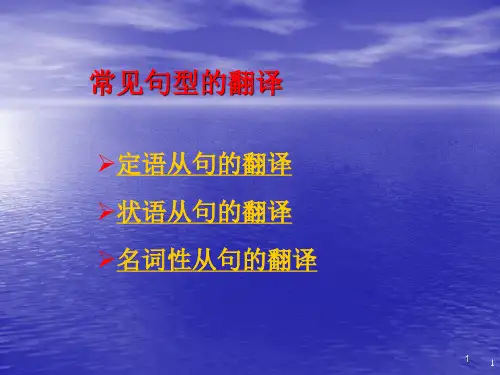
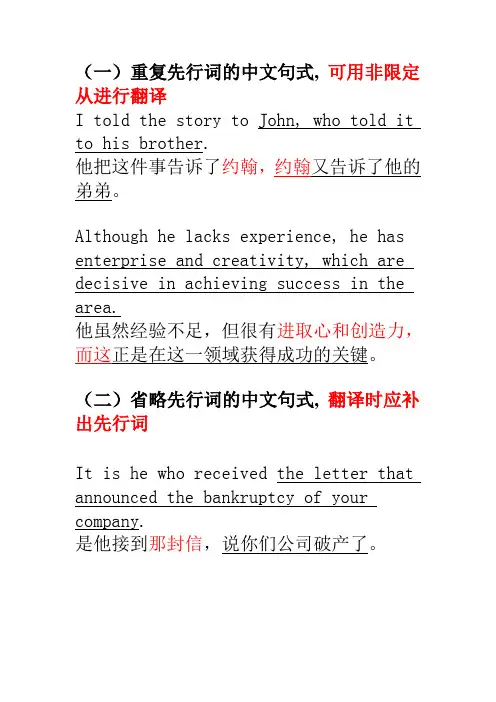
(一)重复先行词的中文句式, 可用非限定从进行翻译I told the story to John, who told it to his brother.他把这件事告诉了约翰,约翰又告诉了他的弟弟。
Although he lacks experience, he has enterprise and creativity, which are decisive in achieving success in the area.他虽然经验不足,但很有进取心和创造力,而这正是在这一领域获得成功的关键。
(二)省略先行词的中文句式,翻译时应补出先行词It is he who received the letter that announced the bankruptcy of your company.是他接到那封信,说你们公司破产了。
They worked out a new method by which production has now been rapidly increased.他们制定出一种新方案,采用之后生产已迅速得到提高。
(三)某些状语译成定语从句(一)译成表示“时间”的分句A driver who is driving the bus mustn’t talk with others or be absent-minded.司机在开车时,不许和人谈话,也不能走神。
(二)译成表示“原因”的分句He doesn’t want to talk with Mrs. Smith, who is very haughty and conceited now他不愿和史密斯太太讲话,因为她现在非常傲慢和自负。
(三)译成表示“条件”的分句Men become desperate for any kind of work, which will help them to keep alive their families.人们极其迫切地要求工作,不管什么工作,只要它能维持一家人的生活就行。
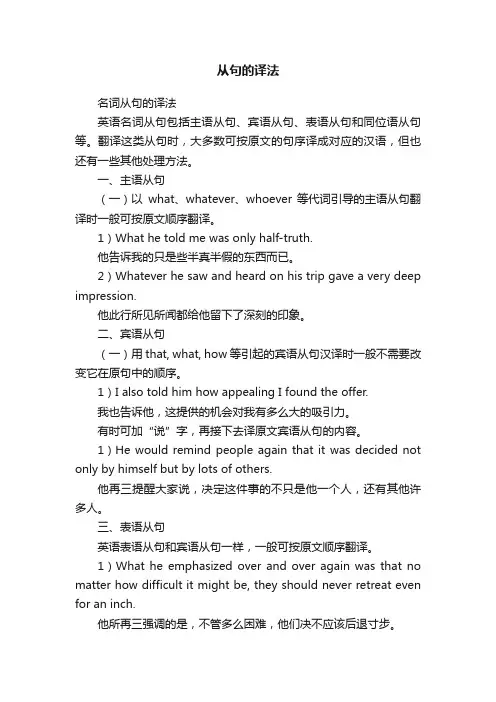
从句的译法名词从句的译法英语名词从句包括主语从句、宾语从句、表语从句和同位语从句等。
翻译这类从句时,大多数可按原文的句序译成对应的汉语,但也还有一些其他处理方法。
一、主语从句(一)以what、whatever、whoever 等代词引导的主语从句翻译时一般可按原文顺序翻译。
1)What he told me was only half-truth.他告诉我的只是些半真半假的东西而已。
2)Whatever he saw and heard on his trip gave a very deep impression.他此行所见所闻都给他留下了深刻的印象。
二、宾语从句(一)用that, what, how 等引起的宾语从句汉译时一般不需要改变它在原句中的顺序。
1)I also told him how appealing I found the offer.我也告诉他,这提供的机会对我有多么大的吸引力。
有时可加“说”字,再接下去译原文宾语从句的内容。
1)He would remind people again that it was decided not only by himself but by lots of others.他再三提醒大家说,决定这件事的不只是他一个人,还有其他许多人。
三、表语从句英语表语从句和宾语从句一样,一般可按原文顺序翻译。
1)What he emphasized over and over again was that no matter how difficult it might be, they should never retreat even for an inch.他所再三强调的是,不管多么困难,他们决不应该后退寸步。
2) That was how a small nation won the victory over a big power.就这样,小国战胜了大国。
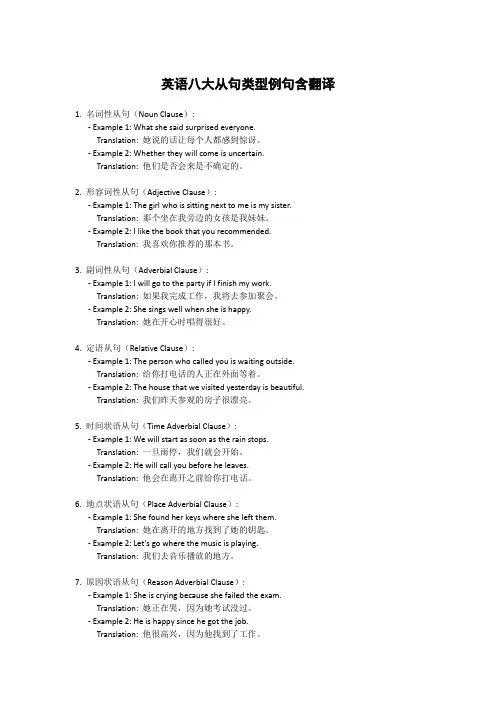
英语八大从句类型例句含翻译1. 名词性从句(Noun Clause):- Example 1: What she said surprised everyone.Translation: 她说的话让每个人都感到惊讶。
- Example 2: Whether they will come is uncertain.Translation: 他们是否会来是不确定的。
2. 形容词性从句(Adjective Clause):- Example 1: The girl who is sitting next to me is my sister.Translation: 那个坐在我旁边的女孩是我妹妹。
- Example 2: I like the book that you recommended.Translation: 我喜欢你推荐的那本书。
3. 副词性从句(Adverbial Clause):- Example 1: I will go to the party if I finish my work.Translation: 如果我完成工作,我将去参加聚会。
- Example 2: She sings well when she is happy.Translation: 她在开心时唱得很好。
4. 定语从句(Relative Clause):- Example 1: The person who called you is waiting outside.Translation: 给你打电话的人正在外面等着。
- Example 2: The house that we visited yesterday is beautiful.Translation: 我们昨天参观的房子很漂亮。
5. 时间状语从句(Time Adverbial Clause):- Example 1: We will start as soon as the rain stops.Translation: 一旦雨停,我们就会开始。
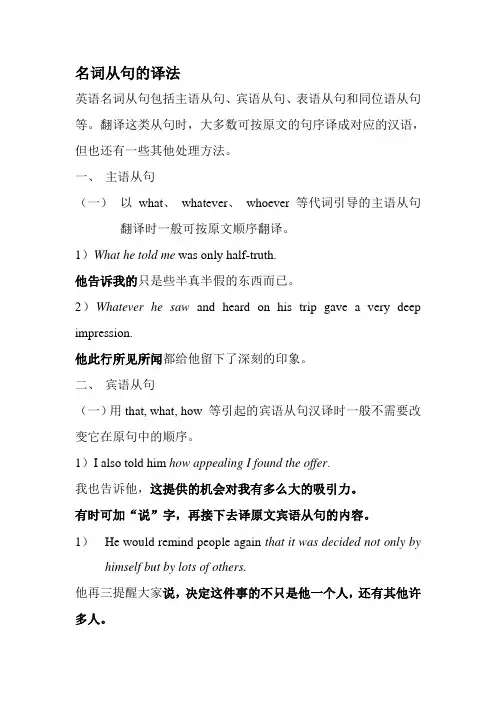
名词从句的译法英语名词从句包括主语从句、宾语从句、表语从句和同位语从句等。
翻译这类从句时,大多数可按原文的句序译成对应的汉语,但也还有一些其他处理方法。
一、主语从句(一)以what、whatever、whoever 等代词引导的主语从句翻译时一般可按原文顺序翻译。
1)What he told me was only half-truth.他告诉我的只是些半真半假的东西而已。
2)Whatever he saw and heard on his trip gave a very deep impression.他此行所见所闻都给他留下了深刻的印象。
二、宾语从句(一)用that, what, how 等引起的宾语从句汉译时一般不需要改变它在原句中的顺序。
1)I also told him how appealing I found the offer.我也告诉他,这提供的机会对我有多么大的吸引力。
有时可加“说”字,再接下去译原文宾语从句的内容。
1)He would remind people again that it was decided not only by himself but by lots of others.他再三提醒大家说,决定这件事的不只是他一个人,还有其他许多人。
三、表语从句英语表语从句和宾语从句一样,一般可按原文顺序翻译。
1)What he emphasized over and over again was that no matter how difficult it might be, they should never retreat even for an inch.他所再三强调的是,不管多么困难,他们决不应该后退寸步。
2) That was how a small nation won the victory over a big power.就这样,小国战胜了大国。

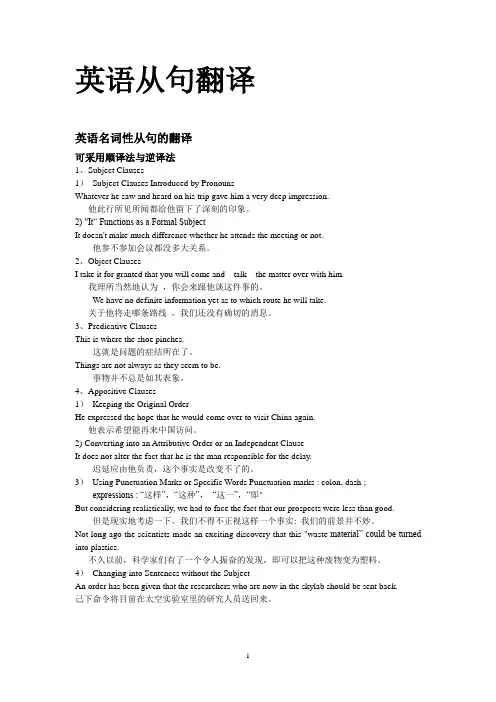
英语从句翻译英语名词性从句的翻译可采用顺译法与逆译法1、Subject Clauses1)Subject Clauses Introduced by PronounsWhatever he saw and heard on his trip gave him a very deep impression.他此行所见所闻都给他留下了深刻的印象。
2) "It“ Functions as a Formal SubjectIt doesn't make much difference whether he attends the meeting or not.他参不参加会议都没多大关系。
2、Object ClausesI take it for granted that you will come and talk the matter over with him.我理所当然地认为,你会来跟他谈这件事的。
We have no definite information yet as to which route he will take.关于他将走哪条路线,我们还没有确切的消息。
3、Predicative ClausesThis is where the shoe pinches.这就是问题的症结所在了。
Things are not always as they seem to be.事物并不总是如其表象。
4、Appositive Clauses1)Keeping the Original OrderHe expressed the hope that he would come over to visit China again.他表示希望能再来中国访问。
2) Converting into an Attributive Order or an Independent ClauseIt does not alter the fact that he is the man responsible for the delay.迟延应由他负责,这个事实是改变不了的。
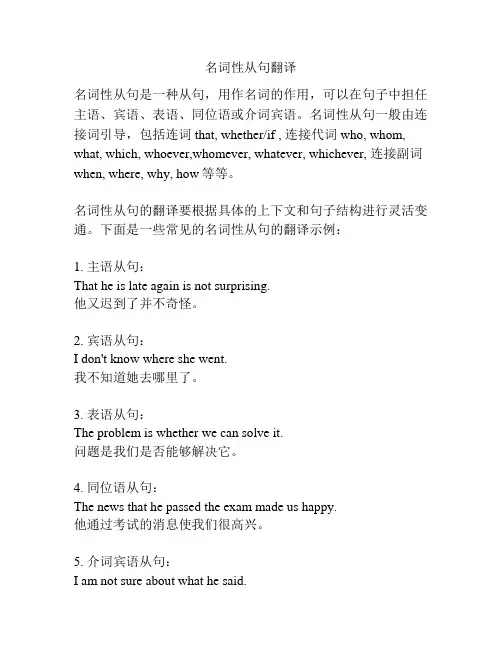
名词性从句翻译名词性从句是一种从句,用作名词的作用,可以在句子中担任主语、宾语、表语、同位语或介词宾语。
名词性从句一般由连接词引导,包括连词that, whether/if , 连接代词who, whom, what, which, whoever,whomever, whatever, whichever, 连接副词when, where, why, how等等。
名词性从句的翻译要根据具体的上下文和句子结构进行灵活变通。
下面是一些常见的名词性从句的翻译示例:1. 主语从句:That he is late again is not surprising.他又迟到了并不奇怪。
2. 宾语从句:I don't know where she went.我不知道她去哪里了。
3. 表语从句:The problem is whether we can solve it.问题是我们是否能够解决它。
4. 同位语从句:The news that he passed the exam made us happy.他通过考试的消息使我们很高兴。
5. 介词宾语从句:I am not sure about what he said.我不确定他说的是什么。
6. 间接引导名词性从句:He asked where I lived.他问我住在哪里。
7. 是否从句:I wonder whether/if she will come to the party.我想知道她是否会来参加派对。
8. 选择性从句:He asked me whether I preferred coffee or tea.他问我是喜欢咖啡还是茶。
9. 宾语从句(陈述句变为疑问句):Do you know what time it is?你知道现在几点钟吗?10. 宾语从句(连接代词):I wonder who is going to pick us up at the airport.我想知道谁会在机场接我们。
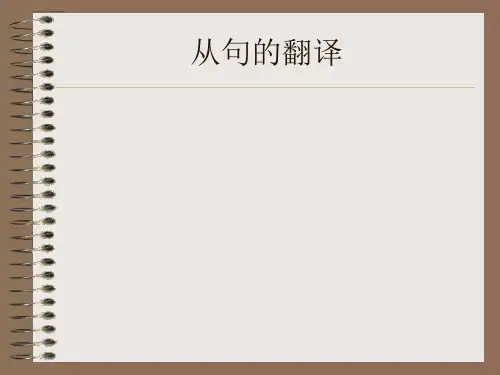
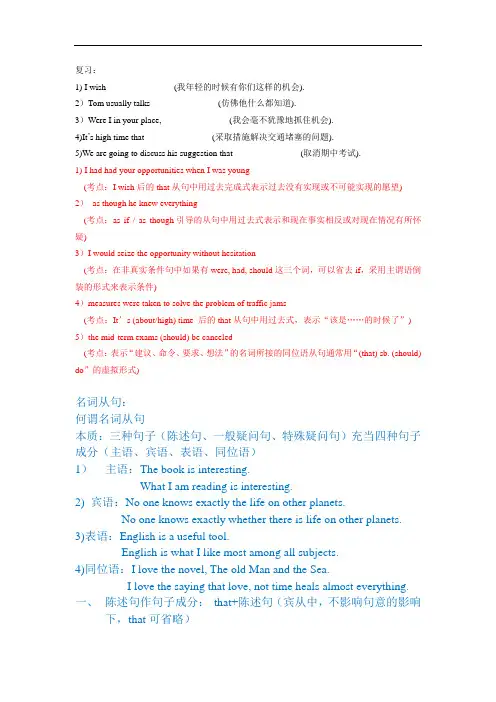
复习:1) I wish _______________(我年轻的时候有你们这样的机会).2)Tom usually talks _______________(仿佛他什么都知道).3)Were I in your place, _______________(我会毫不犹豫地抓住机会).4)It’s high time that _______________(采取措施解决交通堵塞的问题).5)We are going to discuss his suggestion that _______________(取消期中考试).1) I had had your opportunities when I was young(考点:I wish后的that从句中用过去完成式表示过去没有实现或不可能实现的愿望)2)as though he knew everything(考点:as if / as though引导的从句中用过去式表示和现在事实相反或对现在情况有所怀疑)3)I would seize the opportunity without hesitation(考点:在非真实条件句中如果有were, had, should这三个词,可以省去if,采用主谓语倒装的形式来表示条件)4)measures were taken to solve the problem of traffic jams(考点:It’s (about/high) time 后的that从句中用过去式,表示“该是……的时候了”) 5)the mid-term exams (should) be canceled(考点:表示“建议、命令、要求、想法”的名词所接的同位语从句通常用“(that) sb. (should) do”的虚拟形式)名词从句:何谓名词从句本质:三种句子(陈述句、一般疑问句、特殊疑问句)充当四种句子成分(主语、宾语、表语、同位语)1)主语:The book is interesting.What I am reading is interesting.2) 宾语:No one knows exactly the life on other planets.No one knows exactly whether there is life on other planets. 3)表语:English is a useful tool.English is what I like most among all subjects.4)同位语:I love the novel, The old Man and the Sea.I love the saying that love, not time heals almost everything.一、陈述句作句子成分:that+陈述句(宾从中,不影响句意的影响下,that可省略)1)English is important.That English is important is an undoubted fact.2)Love , not time heals all wounds.I’ve learned that love, not time heals all wounds.3)The child should be sent to school.My idea is that the child should be sent to school.4)He succeeded in the experiment.The fact that he succeeded in the experiment pleased everybody.为什么用that?that 相当于“指路牌”,能帮我们指明断句的方向,不造成对句子的误解。
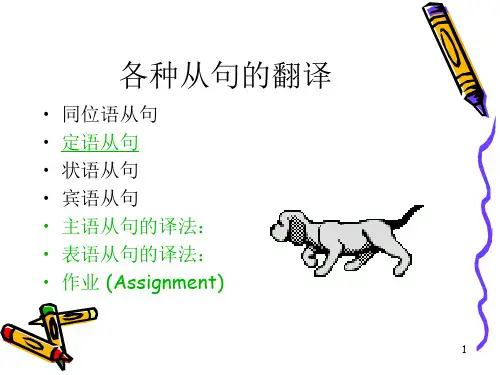
从句怎么翻译从句是一个句子的一部分,包含一个主语和一个谓语,但不能独立成句。
从句可以通过引导词或连接词与主句连接起来。
从句可以分为三类:名词从句、形容词从句和副词从句。
名词从句是用作主语、宾语或表语的从句。
常见的引导词包括that, what, who, whom, whoever, whatever, which, whichever等。
名词从句可以用来引述、提问、想象、询问、命令、怀疑等。
例如:- I don't know what he wants.- Can you tell me where they are?- Whoever did this will be punished.形容词从句用来修饰名词或代词,通常放在被修饰词后面。
常见的引导词包括that, which, who, whom, whose, whoever, whatever等。
形容词从句使句子更加具体,并提供附加信息。
例如:- The book that I'm reading is very interesting.- She has a friend whose father is a famous actor.副词从句用来修饰动词、形容词、副词或整个句子,通常放在被修饰词后面。
常见的引导词包括when, where, why, how, if, whether, because, although等。
副词从句提供了时间、地点、原因、方式、条件等附加信息。
例如:- I will call you when I arrive.- He asked her why she was crying.总结起来,从句是一个句子的一部分,通过引导词或连接词与主句连接起来。
名词从句用作主语、宾语或表语,形容词从句用来修饰名词或代词,副词从句用来修饰动词、形容词、副词或整个句子。
翻译从句时需要注意保持句子的完整性和语法结构,并正确理解从句与主句之间的逻辑关系。
桂林旅游高等专科学校教案第十六讲从句翻译Lecture 16 Clauses一、名词从句的译法(Noun Clause)(一)主语从句(Subject Clause)(引导词that, what, whether, who, when, where, why, how, which, whose, whatever…)(先译主句还是先译从句?whatever等引导的,先译从句;it作形式主语的,视情况而定)1.It is strange that we should meet here.我们能在这里见面,这真是想不到。
(逆译法:先译从句,后译主句)2. It is essential that every child should have the same opportunity to have education.每个儿童都应当有同样的受教育的机会,这一点是非常重要的。
(逆译法:先译从句,后译主句)3. It is a common misconception that English is extraordinarily difficult for foreigners to learn.英语对外国人来说特别难学,这是一种普遍的误解。
(逆译法:先译从句,后译主句)4. It is a matter of common experience that bodies are lighter in water than they are in air.物体在水中比在空气中轻,这是一种大家共有的经验。
(逆译法:先译从句,后译主句)5. It's really a mystery why all our attempts have been unsuccessful.为什么我们的一切尝试都失败了,这真是个谜。
(逆译法:先译从句,后译主句)6.It is a truth universally acknowledged that a single man in possession of a good fortune must be in want of a wife. (An abstract from Pride and Prejudice, by Jane Austen)a)凡是有钱的单身汉,总想娶位太太,这已经成了一条公认的真理。
英译汉之不同定语从句的译法一、限制性定语从句1. 前置法译成带“的”的定语词组,放在被修饰词之前,变为单句:The people who worked for him lived in mortal fear of him.在他手下工作的人对他怕得要死。
2. 后置法如果从句结构复杂,译成汉语前置定语显得太长而不符合汉语表达习惯时,往往译成后置的并列分句。
1) 译成并列分句,重复英语先行词:They are striving for the ideal which is close to the heart of every Chinese and for which, in the past, many Chinese have laid down their lives.他们正在为实现一个理想而努力,这个理想是每个中国人所珍爱的,在过去,许多中国人曾为了这个理想而牺牲了自己的生命。
2)译成并列句,省略英语先行词:It is he who received the letter that announced the death of your uncle.是他接到那封信,说你的叔叔去世了。
3.溶合法1)溶合法是指把原句中的主语和定语从句溶合到一起译成一个独立的句子的翻译方法。
它较适用于翻译限制性定语从句,如“There be...”结构形式;There are many people who want to see film.许多人要看这部电影。
There is a man downstairs who wants to see you .楼下有人要见你。
1)在定语复合句中,将英语主句压缩成汉语词组做主语,而把定语从句译成谓语,溶合成一个句子:This is a nation that must beg to stay alive.这个国家不讨饭就活不下去。
二、非限制性定语从句1.前置法一些较短而具有描写性的英语非限制性定语从句,可译成带“的”的前置定语:The sun, which had hidden all day, now came out in all its splendour.那个整天躲在云层里的太阳,现在又光芒四射地露面了。
状语从句翻译常用引导词:when, as, while, as soon as, before, after, since , till, until 特殊引导词:the minute, the moment, the second, every time, the day,1. 他回来时我就告诉他。
2. 我说他回来时我就告诉他。
3. 他回来时,他妻子在烧饭。
4. 他看书时,他妻子一直在做饭。
6. 我刚碰到这幅画它就从墙上掉下来了。
7.. 街上的噪音直到半夜才停止。
7. 我们正要动身,这时天突然下雨了。
8. 你喜欢体育,而我喜欢读书。
9. 他一来,我就告诉你。
10. 我刚坐下,电话铃就响了。
11. 我一直等到他来。
12. 直到她回来,我才离开。
2.地点状语从句常用引导词:where特殊引导词:wherever, anywhere, everywhere1. 我住的地方羊很多。
2. 有志者,事竟成。
3. 一般来讲,有工厂的地方空气就会被污染得好严重。
4. 无论你去到哪里,你都要努力工作。
5. 不管我在哪里我都会想到你。
6. 你能去哪里就去哪里。
7. 庄稼在土壤肥沃的地方就会长得好。
3.原因状语从句常用引导词:because, since, as, for特殊引导词:seeing that, now that, considering that1. 因为我喜欢我才干。
2. 既然没人反对,我们就执行这个计划吧。
3. 由于他未及时准备好,我们没等他就走了。
4. 白天短了,因为已是12月了。
5. 很多人都喜欢他因为他善良又热心。
6. 既然每个人都已经到了,我们开始会议吧。
7. 由于天气太糟,我们不得不推迟旅行了。
4.目的状语从句常用引导词:so that, in order that特殊引导词:lest, in case, for fear that,in the hope that, for the purpose that1. 这封信他航空寄去,以便这封信能很快到达。